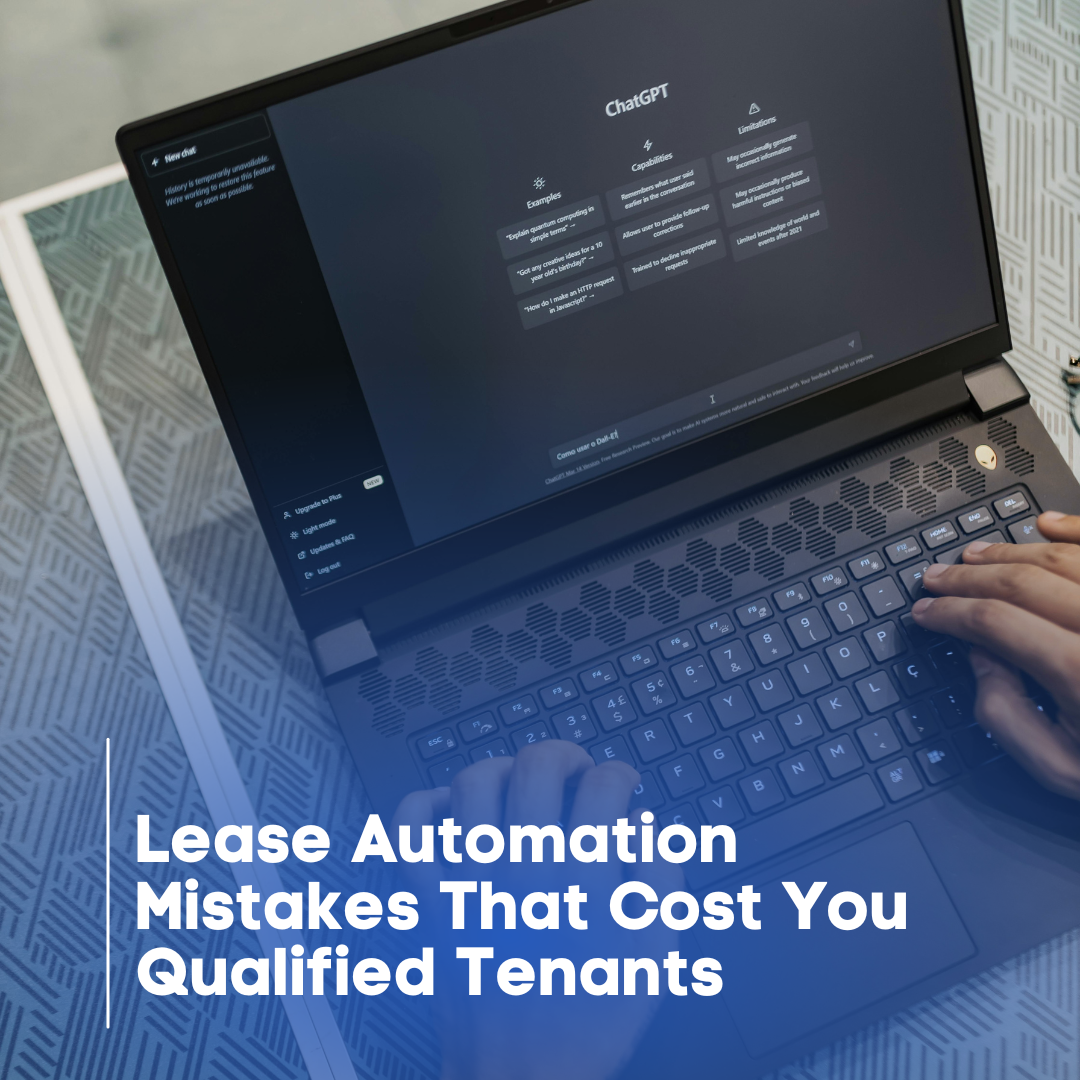
In today’s fast-moving rental market, property managers are under more pressure than ever with the rise of automation tools. They’re expected to grow portfolios, reduce vacancies, and accomplish all this with smaller leasing teams.
So, it’s no surprise that automation feels like the perfect fix; it can handle everything from lease generation and renewals to billing and tenant screening, all while saving time. And when done correctly, automation can truly be a game-changer.
However, automation doesn’t fix broken processes; it just makes them run faster. If your property workflows, lease templates, or software settings aren’t solid to begin with, automation will repeat those same mistakes at scale. Instead of preventing errors, it can magnify them, leading to incorrect lease terms, delayed rent payments, or even Fair Housing issues.
That’s where many property managers get caught off guard. They tend to think of automation as a way to eliminate human error, but in reality, it just shifts where the mistakes happen. Instead of a leasing agent making a one-off typo, you end up with a recurring issue baked into a lease template or billing system. The impact can be severe, including disputes with tenants, legal trouble, financial losses, and even good renters deciding to move on because they no longer trust the management.
Here are a few all-too-common examples:
- A lease auto-renews with the wrong rent amount, sparking a last-minute dispute.
- A digital lease has a typo in the tenant’s name or unit, but once it’s signed, no one can fix it.
- A tenant gets hit with a massive bill due to a software error that no one noticed.
- An AI-powered screening tool denies an applicant without explanation, opening the door to discrimination claims.
In each of these cases, the technology works precisely as intended, but without oversight or legal review, the results can do more harm than good.
Automation shouldn’t just be treated as a software upgrade. The goal isn’t just faster leasing, it’s more innovative leasing, where automation enhances trust, accuracy, and the tenant experience.
When property managers understand both the power and the pitfalls of automation, they can stop scrambling to fix issues after they happen and start building better systems from the ground up. The result? Stronger relationships, fewer legal headaches, and happier tenants who stick around. In this blog, we will explore in detail the top leasing automation mistakes and complaints, and how these pitfalls can impact your property long term.

Top Apartment Lease Automation Complaints from Property Managers
Lease automation has the potential to simplify your workload, but it often introduces new complications that disrupt operations and strain tenant relationships. Based on feedback from property managers like you, here are the most common pain points with today’s apartment lease automation tools:
1. Unreliable Software & Glitches That Disrupt Workflow
You rely on your property management system (PMS) to produce accurate, consistent leases. But when the software mispopulates terms, applies outdated rent figures, or crashes unexpectedly, it does more harm than good.
2. Lack of Responsive Vendor Support
When problems arise, timely support is critical. Unfortunately, many platforms fall short, leaving support tickets unresolved or providing generic responses that don’t address the root issue. This forces you to patch together your solutions, which defeats the purpose of automation entirely.
3. Legal Confusion Around Lease Edits
When automated systems generate errors, it’s not always clear what you’re legally allowed to change, especially if a lease has already been signed. Questions around the enforceability of digital edits, auto-renewals, or last-minute addendums create uncertainty and can expose your team to risk.
4. Billing Errors That Lead to Tenant Disputes
Automation is intended to streamline rent collection, but billing mistakes, such as duplicate charges, misapplied fees, or unexpected back charges, can quickly escalate into tenant disputes. Resolving these issues takes time, erodes trust, and adds friction to your daily operations.
5. No Visibility Into Automated Decisions
Many automated tools operate behind the scenes, providing limited insight into the decision-making process. Whether it’s a lease denial from a screening tool or a failed autopayment, a lack of explanation puts you in a difficult position when tenants ask for answers. It also limits your ability to audit or improve your internal processes.
6. Missing Renewal Notices
Some platforms fail to send lease renewal notices entirely, especially when renewal triggers are tied to lease end dates that were not entered correctly. When tenants don’t receive timely reminders, they may move out unexpectedly or allow leases to convert to month-to-month. This can harm retention and potentially violate legal notice periods.
Top 5 Mistakes That Lead to Automation Issues
Understanding what automation can’t do is just as important as knowing what it can. These common misconceptions often make things worse, both for property managers and their tenants:
1. “Automation Means No Errors”
There’s a common (but dangerous) belief that once a system is in place, it runs flawlessly. In reality, automation only works as well as the templates, settings, and data behind it. If your base lease has a flaw, automation will repeat that flaw at scale. Without regular audits and manual oversight, minor issues can spiral into major headaches, legally, financially, and reputationally.
2. “I Can Just Reissue a Lease If There’s a Mistake”
If an apartment lease has already been signed, you can’t simply update it without the tenant’s agreement. Any change, especially to financial terms, requires a formal addendum signed by both parties. Trying to “correct” documents unilaterally can breach contract law and lead to disputes or even legal action.
3. “Auto-Renewal Guarantees Another Fixed Term”
It’s a common belief that auto-renewal means a lease simply continues under the same terms. But many state laws say otherwise. Without proper notice, your fixed-term lease may default to a month-to-month agreement. If you’re not clear on your state’s rules or don’t communicate renewals proactively, you could find yourself (and your tenants) dealing with unexpected outcomes.
4. “AI Screening Tools Are Fair by Default”
AI-based tenant screening isn’t inherently unbiased. These tools are only as fair as the data and logic behind them, and they can easily violate Fair Housing laws if left unchecked. As the property manager, you’re still responsible for ensuring the system is transparent, equitable, and includes a straightforward appeal process.
5. “Tenants Should Catch Mistakes”
Some managers fall into the trap of thinking that if a billing error or lease typo makes it through, the tenant will point it out. However, this approach erodes trust and unfairly shifts responsibility. Tenants expect accuracy, and when they find mistakes, it reflects poorly on your professionalism. It also creates more administrative work in the long run, as disputes and corrections accumulate.
What Property Managers Are Working Toward
Automation isn’t just about convenience anymore; it’s a strategic response to the growing demands placed on property managers. With larger portfolios and limited staffing, today’s property managers are using automation to stay efficient, protect revenue, and deliver better service. However, for automation to truly help, it must align with your goals, rather than creating more work or risk.
Operational Efficiency
One of the biggest priorities for property managers is cutting down the time spent on repetitive, manual tasks. Whether it’s generating leads for a property, sending rent reminders, managing maintenance requests, or communicating with tenants, automation should simplify your workflow. When done correctly, it reduces errors and enables your team to focus on more strategic tasks, such as resident retention, property maintenance, and compliance.
Financial Stability
Consistent cash flow is the foundation of any successful operation. Automation helps by generating invoices, tracking rent payments, applying late fees, and flagging delinquencies. However, when these systems malfunction, the consequences are immediate: tenant confusion, billing disputes, and delayed revenue. Reliable automation should support your financial processes, not undermine them.
Legal Compliance
With ever-changing landlord-tenant laws, staying compliant can be a moving target. The right automation tools can help standardize your lease terms, flag key dates, and maintain fair screening practices. However, tools that aren’t updated with legal changes or that limit your flexibility can put your team at greater legal risk.
Stronger Tenant Relationships
Tenants expect clear, consistent communication, and automation can help deliver it. From sending receipts and maintenance updates to alerting residents about upcoming renewals, automated systems can improve the tenant experience. However, poor implementation, such as incorrect notices or missed follow-ups, can lead to confusion, frustration, and increased turnover.
Scalability
As your portfolio expands, automation should enable growth to be manageable without requiring additional staff. The right system lets you handle more leases, payments, and tenant interactions with less manual effort. But if your automation tools can’t keep up or require constant oversight, scaling becomes harder, not easier.

Where Property Managers Often Make Mistakes
Even with the best systems in place, automation can sometimes raise more questions than it answers. If you’ve ever been unsure about how to handle a system failure, a lease error, or conflicting legal guidance, you’re not alone. These are some of the most common errors we hear from property managers in the field:
Navigating Legal Nuances
Every state has its own rules regarding lease renewals, notice periods, and amendments. Figuring out exactly what applies in your jurisdiction isn’t always straightforward, and mistakes can carry serious consequences.
Troubleshooting Software Issues
You depend on your systems, but when the platform is buggy, settings are unclear, or errors show up with no explanation, it slows you down. And when support is delayed or unhelpful, you’re stuck wasting time on problems you didn’t create.
Determining Accountability When Errors Occur
If a lease gets updated incorrectly or a required notice doesn’t go out, it’s not always clear who’s at fault: you, your staff, the tenant, or the software. But as the property manager, the responsibility often lands on your shoulders, fairly or not.
Knowing When to Step In
Automation can save time, but it’s not entirely hands-off. One of the most challenging aspects to determine is when to let the system run and when human oversight is necessary.
Choosing the Right Tech Tools
The market is flooded with property management platforms, each promising significant returns. But finding one that fits your workflow, supports your team, and delivers consistent results is a challenge. The wrong choice can cause more problems than it solves.
What Every Property Manager Should Know
To stay ahead and avoid costly mistakes, you need more than just automation. You need practical, actionable guidance across the areas that matter most: legal compliance, system reliability, and process clarity. Here are some of the top areas where sharper insight makes a real difference:
Lease Amendments: Legal Framework & Best Practices
Mistakes happen. When they do, knowing how to correct a signed lease, legally, is essential. Whether you’re issuing an addendum or making a direct change, it’s necessary to be clear on what’s enforceable, how to notify tenants properly, and how to protect your company from disputes.
Auto-Renewals: State-by-State Compliance
Auto-renewals can be convenient, but they also pose a legal risk. You need clear, state-specific guidance on how they work, what kind of tenant notice is required, and how to stay compliant without confusing or frustrating residents.
E-Signatures: Legal Validity & Platform Reliability
Digital leasing is now the norm. But not all e-signature platforms are created equal. You must be confident that the signatures you collect are legally binding and that your system maintains document integrity in the event of a dispute.
Fair Housing & AI Screening Tools
If you use automated screening systems, it’s your responsibility to ensure they’re fair and compliant. That means minimizing algorithmic bias, offering clear reasons for denials, and providing a fair process for appeals, so you stay in line with Fair Housing laws and protect your reputation.
System Issues: Troubleshooting & Escalation Protocols
Software glitches are inevitable, but ongoing problems shouldn’t be. You need a documented process for logging issues, escalating to support, and evaluating whether your platform is still the right fit. When change is necessary, having clear criteria makes transitions smoother.
Data Migration: Smooth Transitions Without Data Loss
Whether you’re switching platforms or onboarding a new management team, data integrity is critical; every lease, payment history, and communication trail matters. Following best practices for data migration ensures you avoid service gaps, tenant frustration, and legal headaches.

Automation Is a Tool—Not a Strategy
As a property manager, automation can help you do more with less, but it’s not a substitute for legal know-how or professional judgment. When poorly implemented, automation can create more problems than it solves, leading to errors, tenant confusion, and lost revenue.
To get a real return on investment (ROI), automation must be aligned with your business goals and thoughtfully integrated into your daily operations. The right automation tools should save time, reduce risk, and support revenue growth, rather than draining resources through rework or legal exposure.
To ensure automation works for you, take a strategic approach:
- Understand the laws that govern your leases.
Stay compliant with state-specific regulations around renewals, notices, and lease changes to avoid costly legal mistakes. - Maintain visibility and control over your systems.
Don’t let your tools become a black box. Monitor outputs, verify critical workflows, and maintain clear and accessible documentation. - Use automation to enhance, not replace, human oversight.
Lean on technology for consistency, but rely on your team’s judgment for context, nuance, and service quality.
When automation is implemented with intention, the ROI is tangible: fewer errors, faster workflows, lower overhead, and better tenant experiences. Your goal isn’t just to move faster, it’s to manage smarter, scale effectively, and protect your bottom line.
Looking to improve your apartment marketing systems?
Categorised in: Apartment Marketing, Market Apartments Services
This post was written by Isabella Housel
Isabella Lagman is a versatile professional writer with a genuine passion for language and storytelling. With over a decade of experience writing about apartment marketing, property management, and the real estate industry, she specializes in creating clear, engaging content that connects with both industry professionals and everyday readers. Her work spans a wide range of formats, from creative storytelling and lifestyle content to informative articles and technical documentation, allowing her to bring both creativity and precision to every project.





